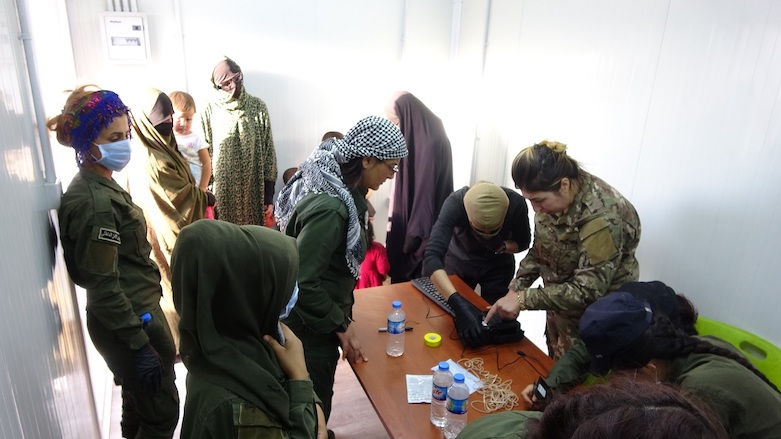Asayish deny security head arrested for smuggling foreign ISIS women from notorious Al Hol camp

ERBIL (Kurdistan 24) – The Internal Security Forces of North and East Syria, also known as Asayish, on Wednesday, denied reports that its security head at the infamous Al Hol camp was arrested for smuggling women with suspected Islamic State ties out of the camp.
The media center for the Asayish released a statement informing the public about reports being circulated online “by some malicious social media pages” that claim the head of the Asayish at Al Hol was involved in the smuggling of women from the camp.
According to the statement, the “false and fabricated” news “comes after the discovery and failure of all means and methods used by the smugglers to smuggle individuals from the camp.”
“Our forces will continue to take all necessary measures to prevent any security breaches within and outside the camp.”
The Al Hol camp was built to house 40,000 individuals but currently holds around 65,000 people, mostly women and children. This includes nearly 11,000 foreign women with alleged ties to the so-called Islamic State and their children.
According to reports, many foreign women from European countries such as Finland, the Netherlands, and Sweden have been able to flee from Al Hol to either Turkish-controlled areas or Idlib by paying smugglers.
Anne Speckhard, director of the Washington-based International Center for the Study of Violent Extremism, said it is hard for the Syrian Democratic Forces (SDF) and local security to control the smuggling out of Al Hol “because the money involved is so large relatively compared to what they are being paid.”
“European women arrange fundraisers via Telegram and Instagram and then get thousands of US dollars sent to them by hawala,” Speckhard told Kurdistan 24.
Hawala is an informal system of money exchange. Often, Syrians in exile use this system to send remittances to their family members still in Syria that are suffering under deteriorating economic conditions.
Thomas McClure, a Syria-based researcher at the Rojava Information Center, said the camp has grown to the size of a small city, which makes it harder to manage.
“The extreme difficulties in controlling tens of thousands of often extremely radicalized women and young men, as well as children, are compounded by a number of factors,” McClure told Kurdistan 24. “The Turkish invasion of last year meant that members of the internal security forces had to be pulled away from [the] Al Hol camp to concentrate on the situation in the frontline.”
McClure added that it is difficult for the SDF to guard the camp when there are daily Turkish and Islamic State sleeper cell attacks.
A recent Pentagon Inspector General (IG) report covering the first quarter of 2020 (Jan. 1 to March 31) suggested there are only 400 guards at the camp and that the SDF has not “increased their security presence at the Al Hol Camp since late 2019.”
The report stated that the Defense Intelligence Agency (DIA) said that “ISIS retains a smuggling network in the camps, bringing in supplies and moving family members in and out; and female ISIS members continued to conduct operations – such as attacks against camp security personnel – in Al Hol using funds received via wire transfers.”
McClure reminded that “the immense cost of maintaining the security and administrative humanitarian operations at Al Hol should not be forgotten.”
The solution, according to him, is full-scale, international support for the Al Hol camp, so the facility can be expanded and security improved.
“More efforts are being undertaken in this field by the Autonomous Administration but this is not a burden which they [can] shoulder alone and it’s the responsibility of the international community to take care of the situation [at the] Al Hol camp.”
Editing by Karzan Sulaivany
